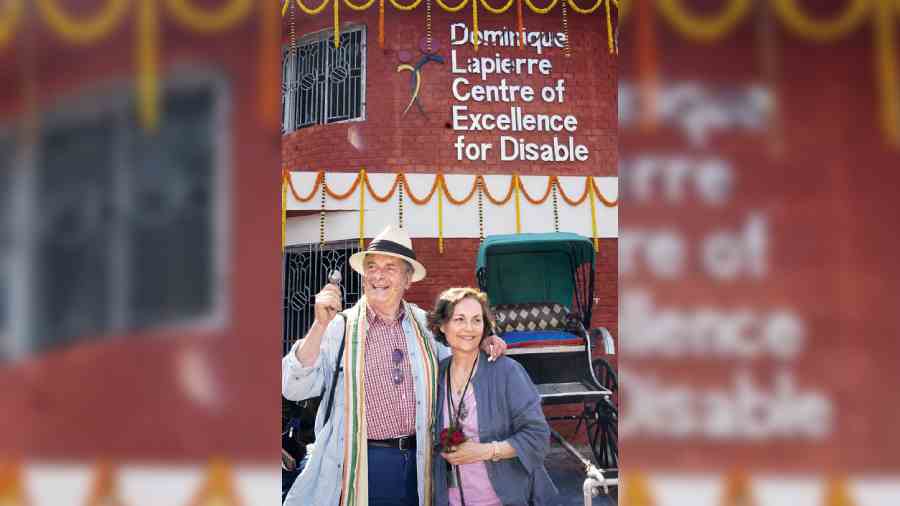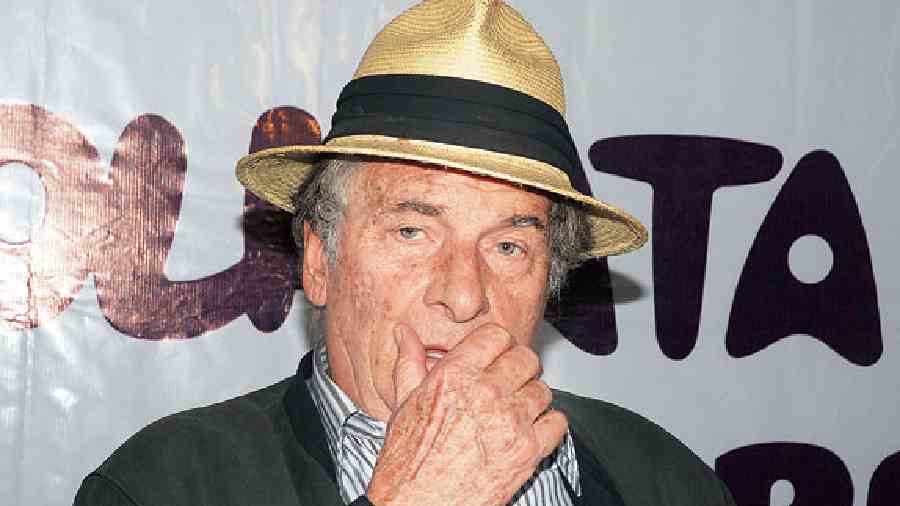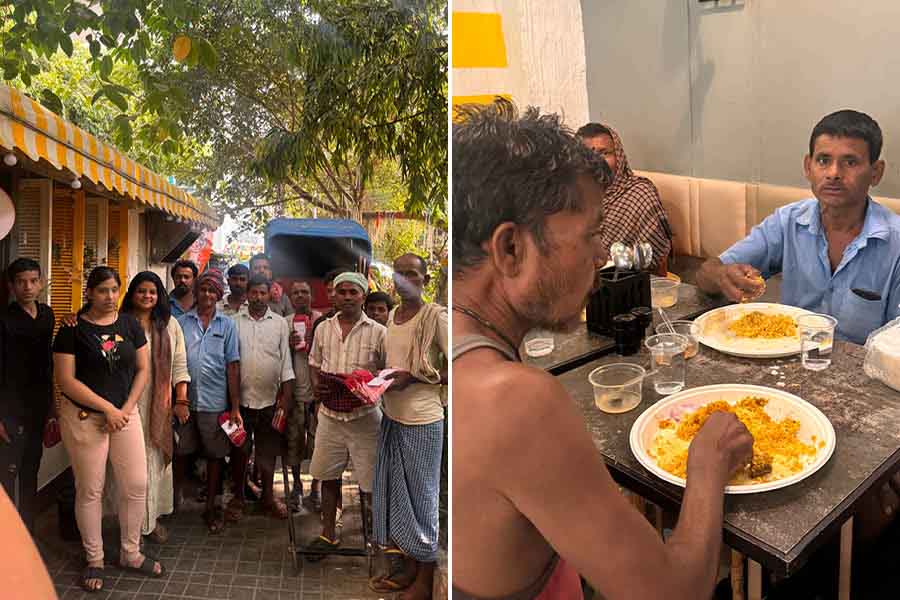He was a lovable anomaly. I met this man dressed in a checked cotton shirt and a white panama hat kneeling by Mother Teresa at Kalighat, at the Missionaries of Charity. A largish nose speckled with beads of sweat. The heat didn’t faze him. He watched with affectionate wonder at the caress of the hand that was being held by the nun in the blue-bordered sari who was stooping over the famished body filled with sores. It was a leper’s hand. In the midst of the rickshaw-pullers’ ting-tings and the deafening yellow taxi horns, there was a spectacular silence in that nine sq.ft by the nullah where the man lay dying. I was surprised by the effect the two white people had on me in my city. A city I had grown up in where it was unusual to see a white sahib kneeling by a leper accosted by a stinking sewer. Later, as I went to meet Mother Teresa, I was introduced to the man who spoke BengaIi with a haunting French accent. He was fluent, nonetheless, as someone who was passionate about communicating in a language with a lover, and didn’t care about the correctness. Dominique Lapierre was in his 50s and I was all of 24 — a rookie reporter with eyes wide open, on vacation in Calcutta from the Illustrated Weekly of India, the signature magazine of the Times of India, Bombay. “This is the great author and Calcutta lover Dominique Lapierre,” someone said.
In a casual chat over an hour I learnt of his love of “velvet and open drains”, to borrow an oxymoron from George Bernard Shaw. “I do love luxury, but in this city I am happy in a modest hotel room which has clean water and air-conditioning,” he said. It was a memorable hour, and one that endeared him to me, as he swiftly cut through my youthful skepticism with his down-to-earth embrace of the street children who obviously doted on him. When I asked him if the dives he patronised so unabashedly were safe and what about the hygiene? “Some of the best meals I have had at bustees where people have trouble putting elaborate meals on the table; but the love makes those dishes,” he retorted.
He loved the shorshe maachh of the Bengali ranna ghar he stated quite unabashedly, and named several iconic dives where unpolished rice and delicious maachher jhal were the staple of rickshaw-pullers and factory workers, where he was a regular. He had no disgust in eating off the aluminium thalas that had been washed at a gali water spout. He wasn’t just a champion of the city but understood the pulse of the poor, rural Bengal, which was where the heart of Bengal throbbed and struggled.
In 2007, years after I had first met him, I saw a photograph of him attending the dedication of a school in Lakshmikantapur where Lapierre had gone in person to support the education of the children of the poor and challenged. Remarkable, I pondered, rarely does a prodigiously rich, relevant and successful writer ever so readily give away his wealth so generously. And then follow his philanthropy through, braving the heat, dust and dirt of a visit in person. When I had asked him what he found alluring that made him celebrate a city that was touted as the filthiest and most chaotic metropolis of the muddle that was India, he said it was “the smiles in the faces of the people and the energy in the eyes of the most challenged “that made him want to help in improving in a little way the pain that had scarred the lives of the poor and the helpless”.
Those notes in a diary, scribbled years ago, when I met him for that one unforgettable hour was, I suspect, the impulse that jump-started the 1985 novel City of Joy — about the heart-breaking struggle of a rickshawwallah in Calcutta. It was a majestic success. It made the world aware of humanity that resided in the abject lives of the poorest urbanites, who had limited access to food, shelter, drinking water and toilets in far-flung places. It was one of the greatest successes of globalisation through cinema, where a film, based on Lapierre’s book, was released in 1992, starring Patrick Swayze and directed by Roland Joffe, brought the terror and triumph of poverty to readers and cinema-goers the world over.
In the early 1980s, after the publication of Freedom at Midnight, about the Indian Independence movement (1975) — critically acclaimed as a balanced and moving account of the partition of India, Lapierre arrived with his wife at Mother Teresa’s, in Calcutta. The conversation between them was beamed across continents; Lapierre began by giving her $50,000, saying: “It’s a drop in the ocean of needs.” The nun (who died in 1997 and was declared a Saint by Pope Francis in 2016) replied: “Without them, the ocean would not be the ocean.” He then gave several million dollars to programmes to fight leprosy, cholera or tuberculosis, for the construction of housing or the distribution of microcredits.

Author Dominique Lapierre with his wife Dominique Conchon-Lapierre in Lakshmikantapur, Bishnupur, to attend the dedication of a school supported by him in his name
Lapierre was born in Chatelaillon on July 30, 1931, to a diplomat father and a journalist mother. He worked as a reporter for French magazine Paris Match in the 1950s — a job that sent him around the world. In West Bengal, he was “revered as an idol” — according to a 2012 article by Paris Match magazine — when he banged the drum for funding for humanitarian centres as donations dried up following the economic crisis in the US and Europe. He sold about 50 million copies of the six books he wrote in collaboration with the American writer Larry Collins — the most famous being Is Paris Burning?. The non-fiction book published in 1965 documented the events leading up to August 1944, when Nazi Germany surrendered control of the French capital, and was adapted for the silver screen by Francis Ford Coppola and Gore Vidal.
Larry, the American collaborator, and Dominique, the Frenchman, complemented each other like brothers in arms, as they both brought two powerful elements to their books — Larry was the fact man and Dominique the lyricist. It was a partnership that yielded astonishing dividends of riches of fame and fortune. They were close and their friendship bloomed with professional partnership. For the longest time, Lapierre and Collins were neighbours in St Tropez, on the beautiful French Riviera, their residences separated by a tennis court.
“At 91, he died of old age,” his wife, Dominique Conchon-Lapierre, told the French newspaper Var-Matin on Sunday, December 5. She added that she is “at peace and serene since Dominique is no longer suffering”. Recalling the wondrous moment I was allowed by the universe to witness, in the space with the Saint, the writer extraordinaire and the suffering soul that Indian summer at Kalighat, I am sure Dominique Lapierre is in tranquil grounds with his old friend and collaborator Larry Collins, thinking of the state of the world they have left behind. And Dominique would be savouring the fish curries that he told me he could savour every day on Earth.






